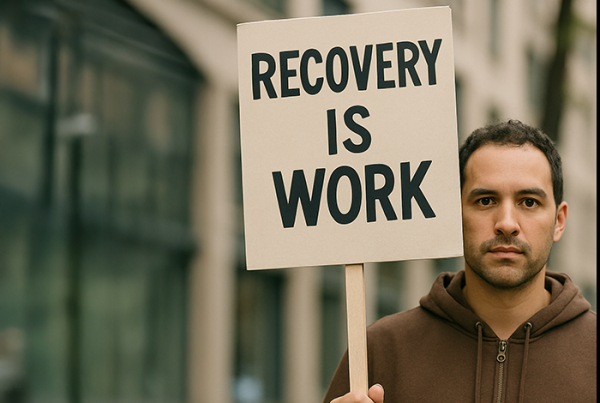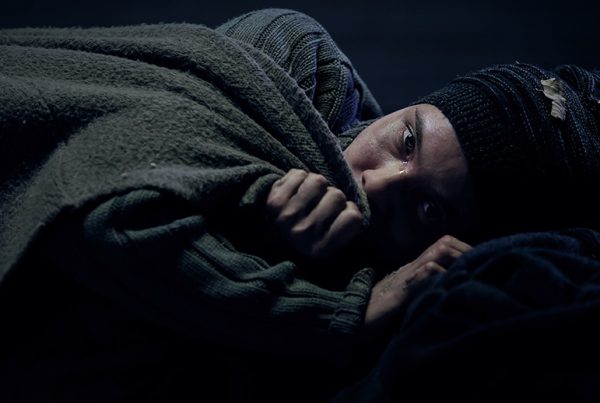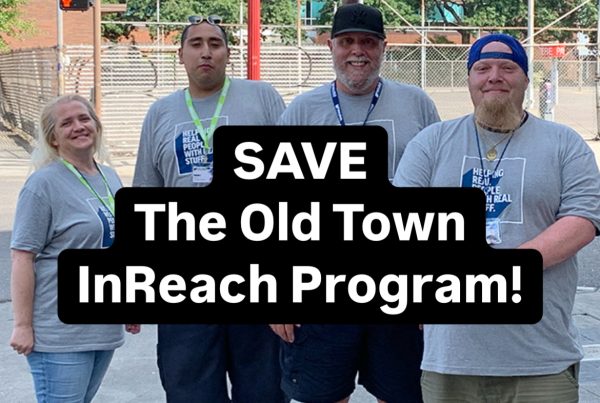Blanchet House’s Peer Support and Housing Specialist, Duke Reiss, depends on Portland Street Response to assist clients facing severe difficulties. When he’s unable to offer further assistance, Portland Street Response is the sole resource he can turn to for help.
By Julie Showers with Duke Reiss
Portland Street Response (PSR) has become an essential resource for homeless social service providers such as Blanchet House, as they navigate the complexities of aiding individuals facing homelessness, mental health challenges, and addiction. In moments of dire need, Duke Reiss, a Peer Support and Housing Specialist at Blanchet House, turns to PSR, relying on their customized assistance to address the unique needs of those in crisis.
“Back in February, we had an elderly meal guest lying outside in the rain, naked, sobbing in the fetal position and shivering. Cops came out for a wellness check and she became escalated with them as they stood watching her. She needed someone to come, sit down with her, and develop rapport first,” Duke says. “Being able to meet people where they are at is important. PSR was able to connect her to Adult Protective Services which assigned her a case manager.”
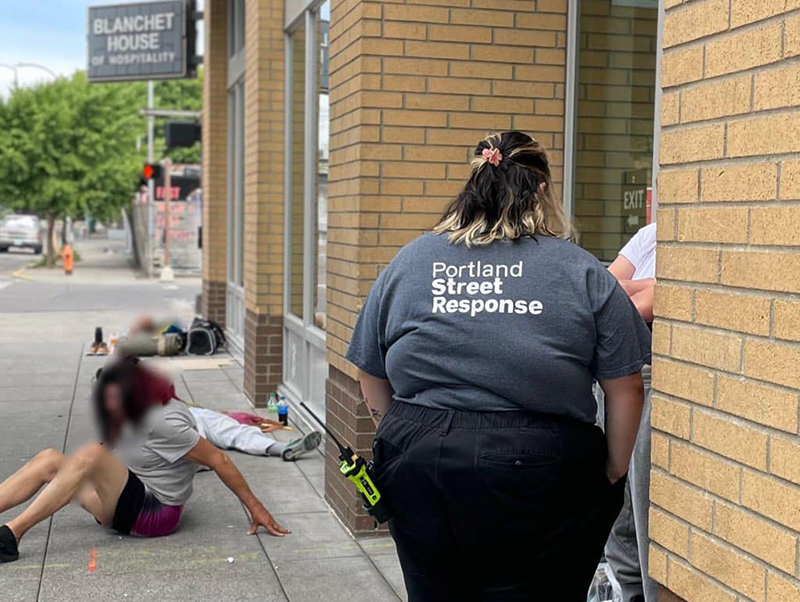
A Portland Street Response team member talks with a person in crisis outside Blanchet House.
Portland Street Response Has Time to Build Rapport and Trust
When individuals experience mental health or other non-violent crises, calling the police or 911 may not be the most suitable course of action, but assistance is still needed. That’s where PSR staff excel.
Without PSR, the elderly woman outside Blanchet House might have remained on the ground without aid to suffer alone. Vulnerable individuals like her cannot be forced to go to a hospital or shelter against their will unless they pose a risk of violence to themselves or others.
“I’ve connected a lot of veterans to Veteran’s Affairs (VA) and seniors to Adult Protective Services (APS) through PSR. Because they are mobile outreach they can follow up with homeless guests. That 24 hours can be the difference between life and death,” Duke says.
It’s a team effort between Duke and PSR to access help for someone in crisis. When the root causes for someone’s homelessness are multifaceted, it takes a web of providers to improve their circumstances.
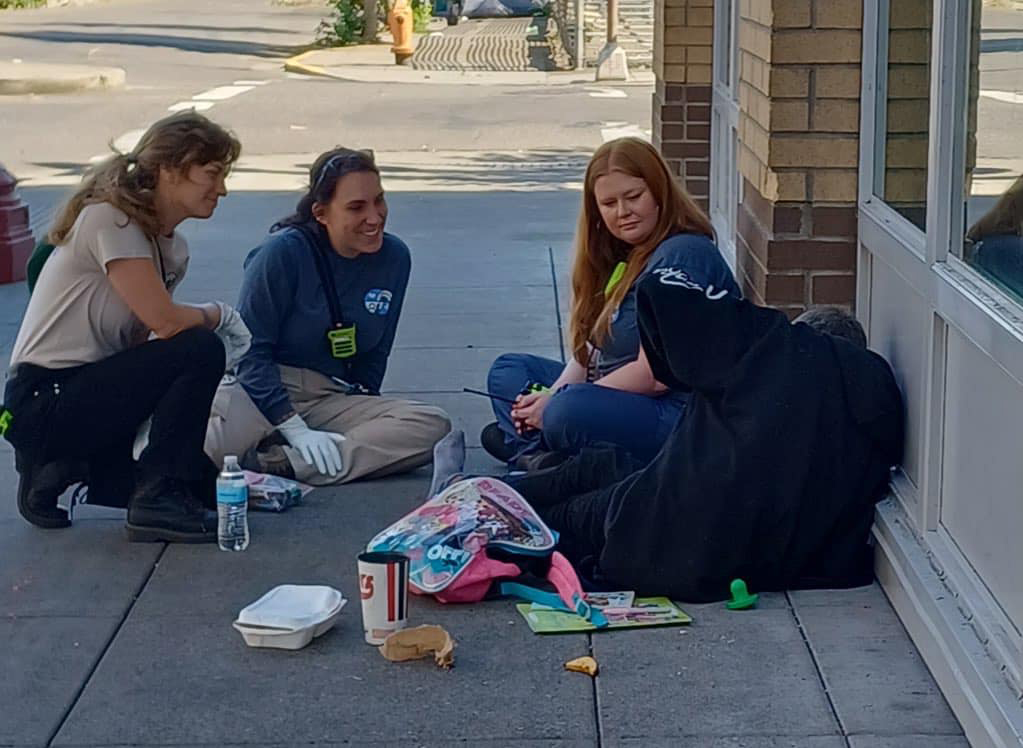
Portland Street Response builds rapport with a woman in crisis outside Blanchet House.
Portland Street Response Can Streamline Access to Shelter
A recent call to PSR involved a homeless disabled woman with both legs amputated above the knees. Well-known to the staff of Blanchet House’s cafe, she exhibited disruptive behavior during lunch service, throwing cups, displaying altered perceptions, and shouting angrily. For the safety and peace of others, security asked her to leave. However, once outside, she fell to the wet ground beside her wheelchair. She was clearly not in a condition, physically or mentally, to be alone on the street that day. While staff had witnessed her resilience in the past, this situation was particularly distressing. Lying vulnerable on the rain-soaked sidewalk with only a tarp for shelter, she left the staff feeling shaken, saddened, and at a loss on how to assist her.
“She lay under a tarp next to her wheelchair for hours and refused assistance every time we offered it,” Duke recalled. “I called PSR to come to talk to her because I knew they would show her compassion and have ways to help. PSR arrived within 30 minutes, spoke with her, offered her supplies, and built some trust. She had altered perceptions and asked them to get away from her.”
In crises like this, what’s critical is the patient approach of the PSR team, who were able to dedicate time to her without issuing threats or demands. Individuals enduring chronic homelessness often harbor distrust toward police and care providers due to past traumas. Following the initial visit from PSR, the woman remained hesitant to accept transportation to care, but the following day, she showed signs of improved mental well-being.
Still lying outside when Duke arrived at work, the woman asked him to call the PSR team again.
“They came and hung out with her and were able to coordinate getting her into a shelter,” Duke recalled. “They had a specialized cab to drive her. PSR is connected to the 211 shelters so they can streamline getting people in.”
After days of declining assistance, she finally chose to go to the shelter. The staff at Blanchet House felt relieved knowing that the woman would now be in a safe and dry environment. With her most fundamental need for shelter fulfilled, there was hope that her other needs could now be addressed.
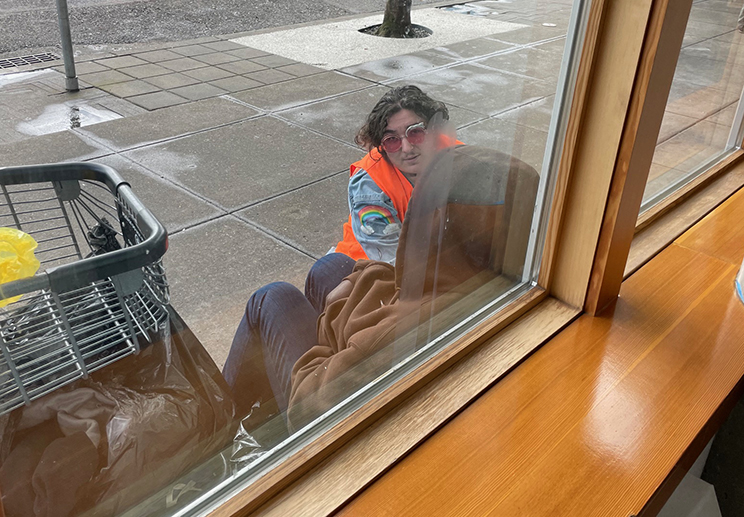
Duke Reiss, a Peer Support and Housing Specialist, called Portland Street Response after talking with a woman in crisis outside Blanchet House.
PSR Can Follow-Up and Meet People Where They Are
Duke emphasizes the significance of PSR’s ability to do outreach and follow-up care. Duke emphasizes the significance of PSR’s ability to do outreach and follow-up care. Their influence within the community extends far beyond merely responding to immediate crises; the ongoing presence and support they provide hold significant value.
“By building rapport and offering ongoing support, PSR creates a lifeline for individuals navigating complex challenges,” Duke says.
Moreover, PSR relieves the burden on first responders like the police and EMTs.
“PSR is the best way to protect our first responders and prevent burnout. Firefighters should be focusing on fire. Police should be focusing on violence. It’s not helpful to turn these first responders into peer support and mental health providers when they already have so much on their plate,” Duke says.
Duke has countless stories of PSR helping people on the street, particularly in cases involving psychosis.
“When someone is experiencing psychosis I can’t just put them in a cab and send them to Unity, [the city’s only mental health urgent care hospital.] In a cab, the person is still experiencing altered perceptions. How can they do an intake interview in that state? PSR will drive them to Unity and stay with them through the intake process,” Duke says.
PSR is an advocate for people who have no one. Individuals in dire crises need the presence of empathetic and understanding caregivers who can accompany them physically to access services and provide essential follow-up care. In two years, PSR has become critical to assisting in crisis intervention at Blanchet House and contributing to the ongoing efforts to address individual homelessness in the city.














